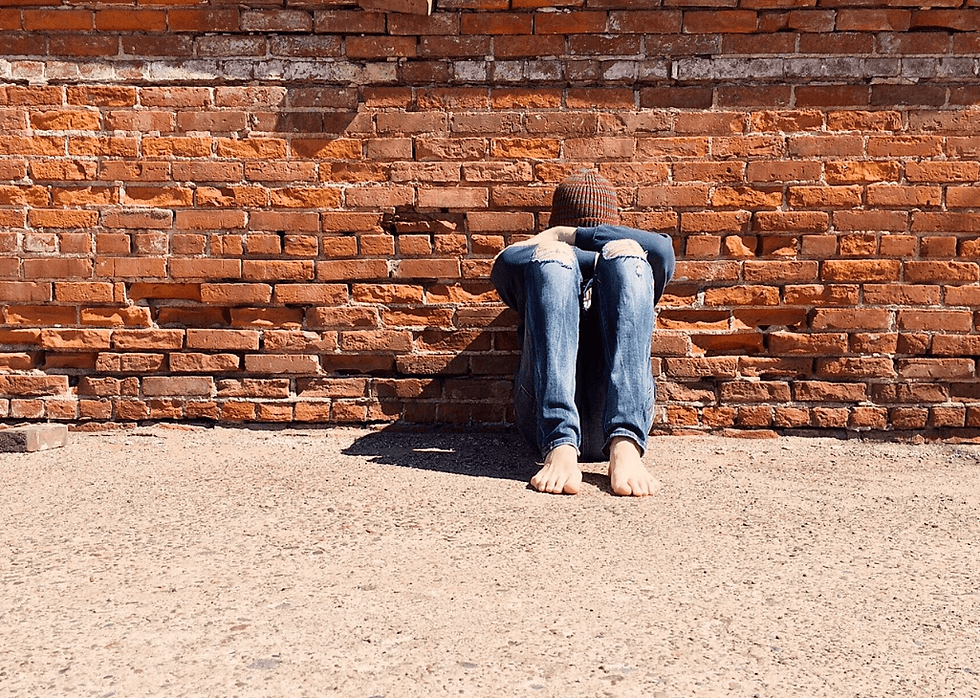Overcoming Shame: Defeat Silence and Build Self-Compassion
- Calvin Black

- Jul 19, 2023
- 5 min read
Updated: Jan 7

I was 9 years old, and our family had been invited to our friend's house for supper. As I sat at the table, picking at my food, I was suddenly filled with a sense of shame. I wondered, “Does everyone know?”

It had been a warm spring day, and after school, playing on the playground, a feeling suddenly washed over me. I couldn’t get to the bathroom in time, so I returned home and was quickly ushered into the car without time to clean up and change. Too embarrassed to let my parents know my condition, I kept quiet, and we went to our friends for supper.
As we ate dinner, subtle wafts of the accident breezed past my nose, and I realized that this might not just be my little secret. Could everyone else smell the disturbance lingering in my pants? Does everyone know?
I wanted to slink into the corner and hide but felt I had to keep up the ruse until later that night when we were driving home and I finally confessed to my parents. After hearing the embarrassing news I think they said, “I was wondering what that smell was.”
Understanding the Nature of Shame
Shame is a common emotion in response to various life events like making mistakes, experiencing rejection, and being abused or neglected. It makes us feel that no one would understand what we have done or experienced. This sense of shame leads us to stay silent about what has happened, what we are feeling, and what we are going through.

No one has done more to highlight the negative impact of shame than Brene Brown. Through her research, writing, and training in shame and vulnerability, she has sparked an international conversation about how shame impacts us and how we can respond.
In her book, Dare to Lead she writes, “If you put shame in a petri dish, it needs three ingredients to grow exponentially: secrecy, silence, and judgment. If you put the same amount of shame in the petri dish and douse it with empathy, it can’t survive.”
Many people who are caught in shame experience this dilemma—shame makes them feel like they can’t talk about it, but talking about it with someone who is a supportive, non-judgmental, and empathetic witness can lead to healing.

If empathy is an antidote to the isolating effect of shame then we should develop kinder ways of treating ourselves when we are caught in shame. One of the ways we can do this is by developing self-compassion. Self-compassion involves treating yourself with kindness and understanding, especially when facing difficult emotions. Instead of criticizing or blaming yourself for your mistakes or perceived shortcomings, try to offer yourself the same kind of support and encouragement that you would offer a friend in a similar situation.
If empathy is an antidote to the isolating effect of shame then we should develop kinder ways of treating ourselves when we are caught in shame.
Practicing Self-Compassion to Build Resilience.
A leading researcher in Self-compassion, Kristen Neff, writes, “Whenever I notice something about myself I don’t like, or whenever something goes wrong in my life, I silently repeat the following phrases: This is a moment of suffering. Suffering is part of life. May I be kind to myself in this moment. May I give myself the compassion I need.” - Self-Compassion: The Proven Power of Being Kind to Yourself.

Neff suggests that practising self-compassion can be a preventative approach to shame, building in us shame resilience. When we are kind to ourselves we are more forgiving and understanding of mistakes that we’ve made. We take care of ourselves by reaching out and getting the support and help that we need, even if shame makes us feel like no one else would understand.
Brene Brown points out in her work that shame can’t exist in empathy. Finding appropriate friends, family, counsellors, or colleagues to talk to can seem daunting at times. We may not feel able to trust just anyone with our experience. But hopefully, you can recognize that there are supportive and empathetic people in your life and they will do their best to meet you in your shame.
Developing self-compassion can help us build resilience to shame because it tempers the overwhelming sense of being unlovable. Being able to share our stories in a supportive relationship helps us move beyond shame to recognize that we are not alone.
How much compassion do you have for yourself? Do you treat your friends with compassion, but critique yourself more harshly? How does shame push you into feeling that no one could understand?
Calvin Black is an Arbour therapist that believes we all need supportive relationships in order to experience well-being. He is interested in narrative approaches to problems and works with youth, individuals, and couples.

Are you curious to learn more about shame, resilience, and self-compassion? Explore the transformative insights offered by Brené Brown and Kristen Neff in their acclaimed books:
Frequently Asked Questions.
1. What is shame, and why do we experience it?
Shame is an emotion that makes us feel small, flawed, or unworthy. It often arises when we believe we’ve failed to meet societal, personal, or relational expectations.
2. How can empathy help overcome shame?
Empathy breaks the cycle of secrecy, silence, and judgment, which allows shame to thrive. By sharing your experiences with someone who listens without judgment, you can begin to heal.
3. What is self-compassion, and how can I practice it?
Self-compassion involves treating yourself with kindness and understanding, especially during difficult times.
4. Can shame really be prevented or reduced?
While shame is a natural human emotion, practicing self-compassion and cultivating empathetic relationships can help build resilience to shame.
5. How do I know if I need professional help?
If shame or negative emotions are significantly impacting your life, reaching out to an Arbour therapist or any other counsellor can be incredibly beneficial.
6. Where can I find more content on shame, self-compassion, and healing?
Calvin Black’s articles offer valuable perspectives on these topics and more. Explore More Articles by Calvin Black:





